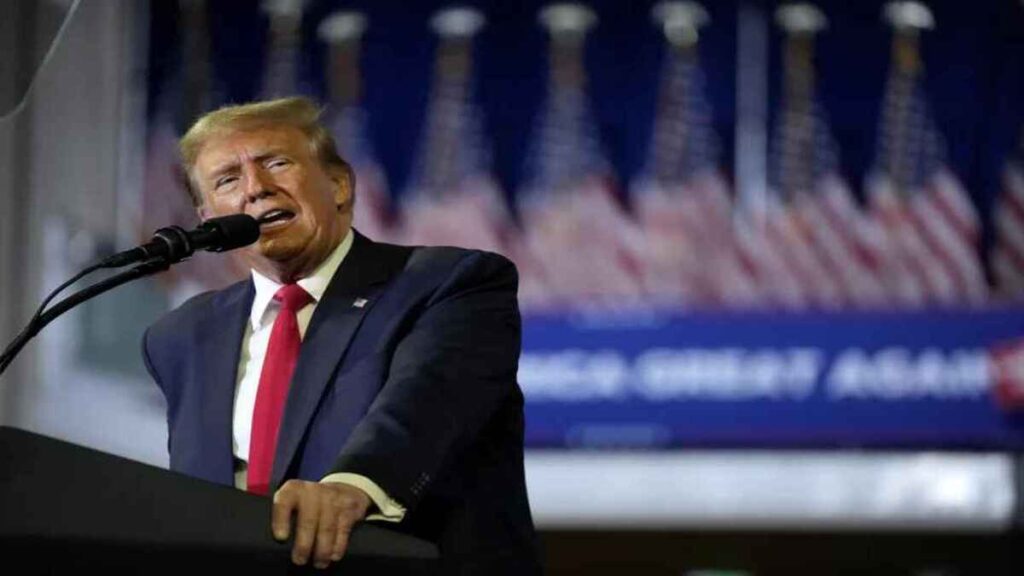
Former President Donald Trump’s recent comments regarding NATO and Russia have stirred controversy, both in Europe and within the Republican Party in Washington.
At a rally in Conway, South Carolina, Trump claimed to have once told a NATO ally that if they failed to meet their defense spending obligations, he would not come to their defense and would encourage Russia to act as they pleased. These remarks, made over the weekend, have prompted concern and condemnation from NATO allies and Democrats alike.
While many Republicans have downplayed or defended Trump’s comments, some have expressed unease over the implications of his statements. Senator Marco Rubio of Florida, a staunch defense advocate, highlighted Trump’s past actions during his presidency, suggesting that Trump did not undermine NATO despite his rhetoric.
Similarly, Senator Mike Rounds of South Dakota emphasized the importance of assessing Trump’s actions rather than his words. He pointed to Trump’s support for NATO and his efforts to bolster defense spending in some member countries as evidence of his commitment to the alliance.
ALSO READ: Supreme Court Expresses Skepticism About Colorado Disqualifying Trump from Its Ballot
Trump’s tightening grip on the Republican Party has led to a shift in its traditional stance on NATO and Russia. Many Republicans, who would have previously reacted strongly to comments perceived as inviting Russian aggression, now appear aligned with Trump’s priorities or have opted to retire from politics.
Former administration officials recall Trump’s repeated threats to withdraw the United States from NATO, a move he might pursue if reelected. However, supporters argue that Trump’s rhetoric should not be taken at face value and that his actions as president demonstrated continued support for NATO.
Retired Lt. Gen. Keith Kellogg, a former Trump administration official, highlighted Trump’s efforts to pressure NATO allies to increase defense spending. He dismissed Trump’s remarks as rhetoric, underscoring the need to focus on his track record rather than his words.
POLL — Do You Support Stricter Gun Control Laws and Assault Weapon Bans?
Some Republicans, like outgoing Senator Mitt Romney of Utah, questioned the seriousness of Trump’s comments but acknowledged their potential impact on international relations. Romney suggested that Trump’s statements were aimed at garnering attention rather than signaling a shift in policy.
Despite criticisms, Trump and his allies remain committed to reevaluating NATO’s role and mission. Kellogg proposed restructuring the alliance to tie collective defense obligations to member countries’ defense spending levels, a departure from NATO’s traditional principles.
Trump’s remarks have drawn parallels to previous comments he made during his presidency, raising concerns among NATO allies and Democrats. However, whether Trump’s statements reflect actual policy intentions or are merely rhetorical bluster remains unclear.
ALSO READ: Trump Defamation Case Judge Orders Jurors Not to Disclose They Were On the Jury
As Europe grapples with Russia’s invasion of Ukraine, Trump’s remarks have added uncertainty to transatlantic relations. NATO Secretary-General Jens Stoltenberg cautioned against undermining alliance solidarity, emphasizing the importance of collective defense in ensuring security.
While some Republicans have defended Trump’s comments as reflecting his past approach, others have expressed concern over their potential consequences. Senator Rubio reiterated the importance of NATO’s strength and emphasized that the alliance’s resilience was not undermined during Trump’s presidency.
You Might Also Like:
Court Indicts Seven in Connection to NYPD Attack
Philadelphia Authorities Recover 5 Bodies From East Lansdowne Home Set on Fire After House Shooting
Kremlin Confirms Tucker Carlson Interviewed Putin, Claims His Views Aren’t “One-Sided”
The Unfortunate LA Freeway Fire Incident That Destroyed Many Immigrant-Owned Businesses
NWS Issues Flash Flood Warnings in California Amid Possible Tornado Reports
